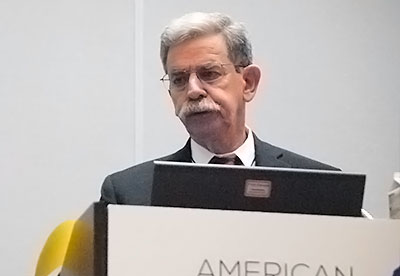Panel Questions Evidence on Deep Brain Stimulation for Depression

Deep brain stimulation (DBS) has been studied as a potential treatment for patients with severe, treatment-resistant depression and other mental illnesses. During a lively scientific session in which presenters discussed the history of psychosurgery from medieval skull drilling to modern neuroscience-guided procedures, some experts cautioned against the use of procedures like DBS for psychiatric disorders.
“Even as far back as 1500, there were critics like Hieronymus Bosch, who warned that behavioral ills could not be cured by a quick surgical fix,” said Stanley Caroff, M.D. (pictured above), an emeritus professor of psychiatry at the University of Pennsylvania Perelman School of Medicine. Today, as DBS is being promoted in medical and popular literature, he and fellow panelists echoed those sentiments. Given the heterogeneity of major depression, the spontaneous and cyclical course of symptoms, and even inconsistency in what qualifies as treatment resistance, invasive brain surgery might be too risky, he said.
While anecdotal case studies and single-site pilot studies have indicated that DBS improves depressive symptoms, the only two, well-controlled, randomized trials (known as RECLAIM and BROADEN) have failed to demonstrate meaningful improvement, Caroff noted. However, many investigators still believe that DBS is a valid approach, and that more adaptive and nontraditional clinical trial designs might provide a fairer test.
“The DBS controversy highlights the dangers and pitfalls of therapeutic enthusiasm,” said Andrew Scull, Ph.D., who is a distinguished professor of sociology at the University of California, San Diego, and studies the social history of psychiatry.
Scull related the story of Henry Cotton, a prominent psychiatrist in the early 20th century and head of the Trenton State Hospital. Enthralled by the germ theory of disease that was gaining national prominence, Cotton believed that infection and sepsis caused mental illness. While the theory was accepted at the time, Cotton’s efforts to stem infection by pulling teeth and removing tonsils failed to improve patients. That failure, however, just led to the use of more drastic procedures, such as removing stomachs and colons.
“Within his logic, nothing was considered negative evidence,” Scull said. “A lack of improvement just meant you had to look elsewhere for the offending sepsis.”
An external investigation eventually found that these surgical procedures were not only ineffective but also associated with 40% mortality rate. Due to Cotton’s prominence, however, the report was suppressed.
The lesson from the Cotton story is that even proven scientific theories can be misinterpreted, so today’s researchers should not think they have cracked the secrets of the brain just because they have MRIs and other neuroimaging tools to guide them, said Robert Coffey, M.D. Coffey is a neurosurgeon who worked for Medtronic (which funded the RECLAIM study) and served on several FDA panels reviewing neurosurgical procedures.
While some studies suggest that DBS should be effective, “the clinical arrows are all pointing in the direction that believing DBS can treat depression is an erroneous hypothesis,” he said.
In concluding statements, Caroff stressed that he and his colleagues were not against neuroscience-guided medicine or other innovative ways to think about mental illness. “We just cannot let medical practice get ahead of our knowledge.”
(Image: Nicholas Zagorski)
|
|
|
|
|

